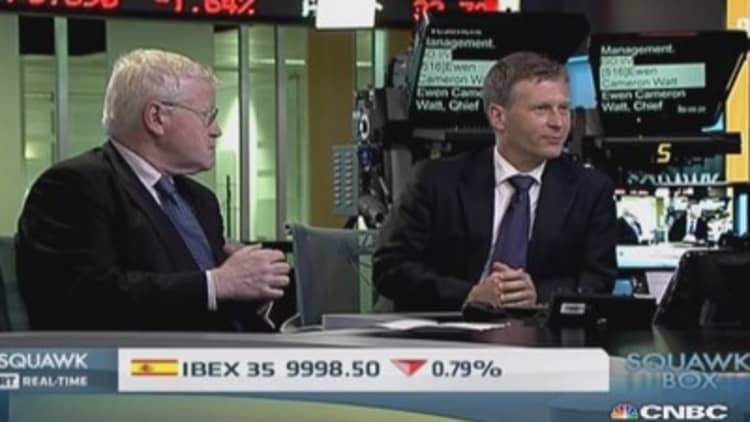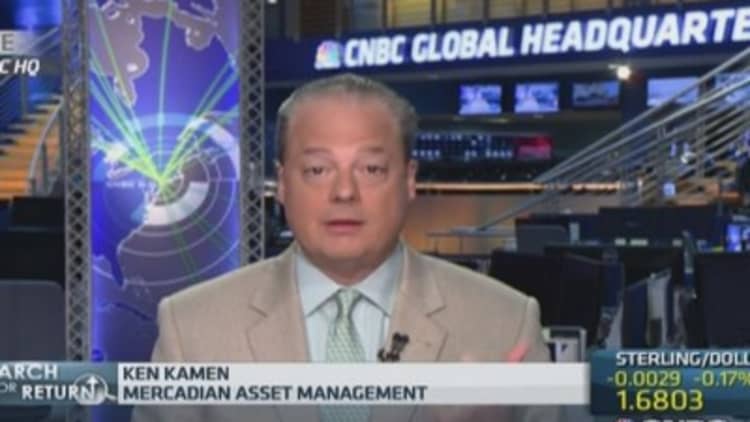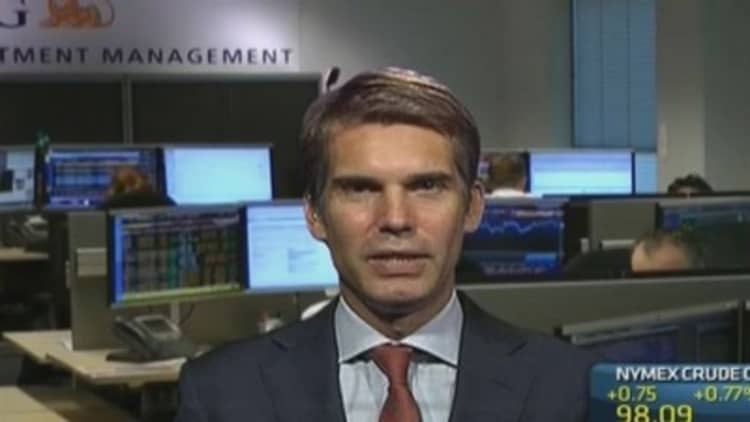
Geopolitical tensions continued to rattle investors' nerves on Friday, but news out of Russia gave markets a reason to relax, with Wall Street futures reversing losses and Germany's DAX off lows.
After trading lower overnight, stock futures turned higher in the 7 a.m. ET hour, after a news report quoting a Russian official saying Russia is seeking to de-escalate the Ukraine conflict. European stock markets came off their lows. Russia's RTS index rose almost 1 percent after Nikolai Patrushev, secretary of Russia's Security Council, spoke to state-run RIA Novosti news agency. The ruble also strengthened
Overnight, Japan's Nikkei slipped 3 percent, while the French CAC moved into market correction territory and the German DAX broke through a key psychological level.
Renewed concerns over Iraq accentuated the downturn with Barack Obama authorizing targeted airstrikes on Thursday evening in an attempt to protect American personnel in the country.
Read MoreObama authorizes targeted airstrikes in Iraq
This adds to retaliatory sanctions from Russia on Thursday, concerns over the future of Federal Reserve policy, ugly economic data from Europe, jitters over financial stocks in the region, and central banks in the U.K. and the euro zone failing to reassure investors at policy meetings this week. Low summer trading volumes have also added to volatility.
"Well I think it's the perfect storm temporarily, as it were, of the worsening geopolitical outlook at a time when the Federal Reserve and the Bank of England have clearly both turned the corner as far as their policy's concerned," Ewen Cameron Watt, the chief investment strategist at BlackRock Investment Institute told CNBC Friday.
Market corrections
After U.S. stocks declined on Thursday, pushing the Dow further into the red for the year, Asian markets followed suit with Japan's benchmark Nikkei index falling to its lowest level since May 30. The pain continued in Europe with the German DAX falling below the 9,000 point level at the open and the Danish market losing 3 percent - pulled lower by the heavily-weighted pharma firm Novo Nordisk. The French CAC 40 moved into correction territory with a 10 percent market drop since its high on June 10.

Portuguese blue-chips slipped 2.3 percent on Friday, before rebounding, and have tanked 30 percent since April, further into bear market territory. Greek stocks also slipped 2 percent for the session and have lost over 20 percent since March. German, Italian and Spanish markets had already entered into a correction before Friday's session open.
In contrast, the and the U.K.'s FTSE 100 have logged falls of around 4 percent since recent highs. U.S. futures on Friday showed the Dow Jones could see a sharp losses at the open, but instead it climbed slightly at open.
Meanwhile, investors opted for so-called "safe havens" with spot gold adding 0.4 percent to its price on Friday morning before paring gains and the yield on the U.S. 10-year Treasury dropped to 2.3576 percent from a close of 2.424 percent on Thursday. German sovereign bonds were also bought with the yield on the 10-year bund pushing further into record low levels with a yield of 1.031 percent.

Respite ahead?
Deutsche Bank's Jim Reid believes that it is becoming clearer that the downing of the Malaysian Airliner last month could now be considered a landmark moment with consequences for the world and with it global financial markets.
Read MoreMarket selloff belies a robust global economy
"At the moment the impact is being felt through lower yields, a weaker bias to risk, very poor liquidity, and some worryingly real-time data releases in Europe," he said in a morning note on Friday.
In addition to simmering geopolitical tensions, traders have also cited concerns over the raising of interest rates by the U.S. Federal Reserve with the central bank set to give more details on its strategy in the next few months. Otto Dichtl, managing director of investment banking firm Stifel Nicolaus Europe, said that the overriding concern for investors - even in Europe - is the policy coming from the U.S. Federal Reserve. He said that the scaling back on asset purchases by the Fed has kept a lid on western risk markets this year.
"Near term it is not clear to me if the dip is already over," he told CBC via email. "Although there are some indicators which suggest at least some near term respite, given that some markets appear oversold."


